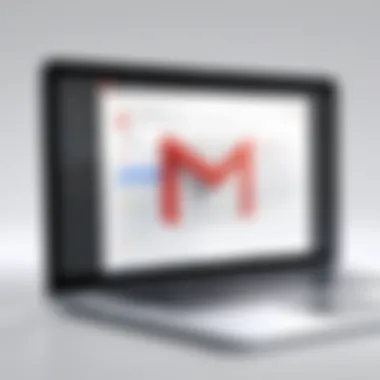Effective Techniques for Finding Gmail Addresses


Intro
In our hyper-connected world, email has become an indispensable tool for communication. Among the vast array of email services, Gmail stands out as a popular choice for many due to its user-friendly interface and robust features. However, the need to locate a Gmail address, whether for reconnecting with an old friend or reaching out to a potential business partner, can be a daunting task. This article delves into various methods that can be employed to discover Gmail addresses, focusing on the ethical considerations, practical techniques, and tools that can assist in the process.
Understanding how to effectively search for a Gmail address requires knowledge of the landscape, including the challenges and limitations involved. As we navigate through the intricacies of email searching, we will touch upon crucial aspects such as privacy concerns, verification techniques, and the ethical implications that one must consider when attempting to locate someone's email address.
Cybersecurity Threats and Trends
The digital communication landscape is riddled with threats that can hinder not only the search for Gmail addresses but also the overall safety of online users. In recent years, a notable increase in cybersecurity threats has been observed, prompting both individuals and organizations to take proactive measures to protect their information.
Notable cybersecurity threats in the digital landscape
Malware, phishing scams, and man-in-the-middle attacks are just a few of the dangers lurking online. Phishing scams, for instance, have become particularly sophisticated. Attackers often masquerade as trusted entities, attempting to trick individuals into revealing their personal information, including Gmail addresses. This underscores the need for awareness and caution while traversing the web.
Emerging trends in cyber attacks and vulnerabilities
Recent trends indicate that cyber attacks are becoming more targeted, utilizing advanced techniques such as social engineering to exploit human behavior. For instance, attackers may collect publicly available information from social media platforms to craft convincing messages to persuade users to disclose their email addresses unwittingly.
Impact of cyber threats on individuals and businesses
For individuals, the consequences of falling victim to these threats can range from identity theft to financial loss. Businesses, on the other hand, face reputational damage and potential financial penalties due to data breaches. As such, understanding the threats within the digital realm is vital for anyone attempting to locate a Gmail address.
Best Practices for Cybersecurity
As we delve into methods for locating Gmail addresses, it is equally important to emphasize the significance of following best practices for cybersecurity.
Importance of strong password management
Using strong, unique passwords for every account is a fundamental step towards securing personal information. A good password should be long and include a mix of letters, numbers, and special characters.
Implementing multi-factor authentication for enhanced security
Multi-factor authentication (MFA) adds an extra layer of protection by requiring a second form of verification when logging in, making unauthorized access significantly more difficult.
Regular software updates and patches for protection
Keeping software, including security programs, up to date is crucial to defend against vulnerabilities. Many cyber threats exploit known weaknesses in outdated software, so timely updates can serve as a powerful defense.
Secure online browsing habits and email practices
Practicing safe browsing methods, such as avoiding suspicious links or attachments, can greatly reduce the risk of encountering phishing attempts. Verifying the source of an email before responding can also safeguard personal information, including Gmail addresses.
Privacy and Data Protection
With the ongoing threats in the digital landscape, privacy and data protection remain paramount considerations.
Importance of data encryption for privacy
Data encryption protects sensitive information by converting it into a format that is unreadable to potential interceptors. Using end-to-end encryption wherever possible can ensure that personal communications remain obscured from prying eyes.
Risks associated with sharing personal information online
Excessive sharing on social media can inadvertently expose personal details, including email addresses. It is crucial to maintain a discerning eye regarding the information shared publicly.
Strategies for safeguarding sensitive data and personal details
Implementing data protection measures such as utilizing anonymizing services or VPNs can help preserve privacy online. Just as one would not leave their front door wide open when welcoming guests, safeguarding one’s private information online is equally essential.
Security Technologies and Tools
Leveraging the right tools can enhance the effectiveness of one's search while also maintaining security.
Overview of key cybersecurity tools and software
Familiarity with cybersecurity tools such as password managers, firewalls, and antivirus software can significantly bolster one’s online defenses. These tools not only aid in protecting personal information but also provide peace of mind.
Benefits of using antivirus programs and firewalls
Antivirus programs and frameworks create a defensive barrier against malware and unauthorized access attempts. Having these tools in place can proactively prevent cyber threats that might compromise sensitive information.
Application of Virtual Private Networks (VPNs) for secure data transmission
VPNs enable secure internet connections by masking IP addresses and encrypting data transmitted over the network, substantially enhancing privacy and protection from eavesdropping.
Cybersecurity Awareness and Education
Promoting awareness about cybersecurity is vital for individuals engaging in sensitive activities like searching for email addresses.
Educating individuals on recognizing phishing attempts


Recognizing signs of phishing attempts is critical. Showing users how to spot these deceptive tactics can empower them to avoid pitfalls that compromise personal information, including Gmail addresses.
Promoting cybersecurity awareness in the digital age
Encouraging discussions around cybersecurity within communities—be it through workshops, online forums, or educational resources—can empower individuals to take control of their online safety.
Resources for learning about cybersecurity fundamentals
Helpful tools like online courses from platforms such as Coursera, Udemy, or articles from trusted sources can greatly enhance one's understanding of the importance of cybersecurity.
Knowledge is power in the digital age. The more informed you are about potential threats, the better equipped you'll be to navigate the online landscape safely.
Understanding the Need for Email Address Lookup
In today’s interconnected world, the ability to locate a Gmail address can be more important than ever. Individuals and organizations alike find themselves in situations where reaching out via email is crucial. Whether it’s for professional networking, reconnecting with an old friend, or conducting research, looking up an email address can open many doors. Understanding the motivations behind email address searches sets the stage for appreciating the various methods available.
Reasons for Looking Up a Gmail Address
There are a myriad of reasons why one might seek out a Gmail address. Here are a few of the most common:
- Professional Networking: In the corporate world, who you know can often be as important as what you know. Finding email addresses can help expand one's professional network.
- Communication: Sometimes, direct communication is essential for resolving issues or discussions. An email could be a more appropriate approach than other forms of contact.
- Research: In academic or market research settings, collecting reliable email addresses may be necessary for surveys or outreach.
- Personal Connections: People often look for old friends or family members they have lost touch with. An email address can be a gateway to rekindling those relationships.
However, while these reasons may seem straightforward, they do carry implications that necessitate a closer look.
Implications of Email Address Searches
Searching for someone’s Gmail address should not be taken lightly. There are ethical considerations intertwined with such endeavors:
- Privacy Concerns: Individuals have a right to keep their information private. Conducting a search without considering someone's privacy can lead to ethical dilemmas.
- Legal Considerations: In some jurisdictions, there are regulations surrounding the gathering and use of personal data, including email addresses. Familiarizing oneself with these laws is important to avoid legal repercussions.
- Intent and Purpose: It’s critical to evaluate the motives behind the search. If one’s intentions are not strictly personal or professional, it could cross moral lines.
"Finding an email address isn't just about the process; it's about respecting the boundaries of individuals as well."
Moreover, using the information responsibly is paramount. Misusing someone's email could not only damage relationships but may also lead to situations like harassment or spam, which are detrimental to both parties.
Fundamentals of Gmail Email Structure
Understanding the structure of a Gmail address serves as a vital foundation for anyone looking to locate an email using this service. A Gmail address is not just a jumble of letters and symbols; it encapsulates specific elements that, when analyzed, can give seekers valuable clues. Mastery of this topic allows individuals to navigate through the complexities of email addresses more effectively. One might think of this structure like a map that can point the way in a digital landscape.
Furthermore, recognizing the nuances in Gmail address formats can lead to more successful search outcomes, saving time and reducing frustration. Without that insight, one might find themselves wandering aimlessly, akin to a ship lost at sea.
The Anatomy of a Gmail Address
A typical Gmail address follows a straightforward format: username@gmail.com. Each part of the address plays a distinct role:
- Username: This is the custom portion chosen by the user, representing identity. It can reflect a person’s name, an abbreviation, or even a profession. Some people creatively integrate numbers or symbols, often leading to uniqueness.
- Domain: The part following the symbol, in this case, "gmail.com" denotes the service provider. This shows that Gmail hosts the email address, immediately indicating the type of account.
Beyond these primary components, there are also variations users might employ, such as periods within the username (for example: "john.doe@gmail.com" vs. "johndoe@gmail.com"). These variations do not affect delivery but can change how an email address is perceived or searched in public contexts. Moreover, Gmail supports plus addressing; using something like "johndoe+news@gmail.com" could indicate a subscription to a newsletter, allowing better organization and filtering later on.
Common Patterns and Identifiers
In addition to the anatomy of an email address, there are several common patterns and identifiers that might be of interest in searches:
- Real Names: Many users often utilize their real names or variants, such as initials, which can be a pivotal clue in finding the correct address.
- Hobbies or Interests: Some individuals include their interests or professions within their usernames, therefore understanding someone’s hobbies could provide insights into their email format. For instance, "musician_jane@gmail.com" potentially leads back to Jane, a musician.
- Numeric Combinations: Numbers often represent significant dates or birth years. Users may incorporate these into their usernames, which can be used as hints during your search.
When searching for a Gmail address, being aware of these identifiers enhances the chances of successfully locating a particular person. By dissecting the components and understanding the patterns that often surface in email creation, seekers can move with greater precision, much like a skilled archer aiming for the bullseye.
Recognizing the nuances in Gmail addresses not only enhances search effectiveness but also sharpens overall digital literacy.
In essence, grasping the fundamentals of Gmail email structure lays the necessary groundwork for further exploration into methods for locating these addresses. By recognizing the anatomy and visible patterns of Gmail addresses, one can approach searches with improved skill and insight, ultimately leading to a more efficient discovery process.
Traditional Methods for Gmail Lookup
Locating a Gmail address doesn’t have to be an uphill battle. Traditional methods provide a solid foundation for this task, leveraging the resources most people access regularly. The importance of these strategies can't be overstated, as they afford individuals the opportunity to maximize their chances of successful email searches without diving headfirst into more complex techniques. They can serve as essential tools crafted from the familiar environments we inhabit, paving the way toward effective communication.
Using Search Engines
Search engines are like the Swiss Army knives of information retrieval, allowing users to dig into a pool of data with just a few clicks. The beauty lies in their simplicity, yet they can yield surprisingly effective results for finding Gmail addresses.
Search Operators
One of the standout features in search engines is the use of search operators. These are special commands and symbols that refine search results, making it easier to locate a specific Gmail address amidst the internet's vast sea of information. For instance, by adding quotation marks around a person's name, you instruct the search engine to look for that exact phrase, avoiding results that may contain irrelevant variations.
Perhaps your query might look something like this:
This precise approach is beneficial because it can lead directly to any public profiles or postings mentioning the email, increasing the likelihood of success. However, it’s critical to remember that not all information is accurate; some pages might update regularly or have outdated content.
Refined Queries
Taking it a step further, creating refined queries can be a game changer. These refined search keywords not only include the target individual's details; they also pinpoint what you know about them, like their workplace or interests. For instance, if you're searching for a Gmail belonging to a graphic designer named Amy who works at XYZ Corp, you might search:


This method can drastically narrow down the results, honing in on the most relevant pages that could potentially reveal the sought-after address. While it’s a powerful search tactic, there’s still a slight chance of overlooking the email if the person has managed to keep a low profile online.
Utilizing Social Media Platforms
Social media is another front in the battle for locating Gmail addresses. With many people openly sharing their contact details in public profiles, platforms such as Facebook and LinkedIn can be goldmines for finding emails. This approach not only harnesses the power of connectivity but also the tendency for people to be more forthcoming on social media.
Facebook stands out for its ubiquity, where a vast number of users engage with friends, colleagues, and family. Many individuals openly list their Gmail addresses on their profiles, making it a prime target for searches. Utilizing Facebook groups or pages dedicated to specific fields might also bear fruit. However, users must be cautious; sometimes, privacy settings might restrict visibility, plus not everyone opts to share their Gmail publicly on their profiles.
In the realm of professional networking, LinkedIn holds a significant advantage. This platform is home to countless professionals who often share their contact information, particularly if they are open to new opportunities. The key characteristic of LinkedIn is its emphasis on professional identity, where users often indicate their full names, job titles, and companies. To find someone’s Gmail, you can explore their contact info under their profile. Yet, it’s worth noting that many people opt to restrict visibility for privacy, which could limit access.
Professional Networks
Beyond just Facebook and LinkedIn, specialized professional networks cater to specific industries, such as GitHub for programmers or Behance for creative professionals. These networks can offer insights into individuals’ work and might even contain direct contact details, including Gmail addresses. The benefit here is the focus on a niche community, allowing users to find industry-specific contacts more easily. However, users should remain vigilant about the potential for outdated or unmonitored profiles.
In navigating the terrain of Gmail address discovery, traditional methods can function as effective launchpads toward success.
Traditional methods, while not perfect, lay down essential strategies grounded in conventional tools. These paths can aid in discovering Gmail addresses by combining search engine prowess with the extensive network potential of social media.
Advanced Techniques for Finding Gmail Addresses
In today's fast-paced digital environment, locating a Gmail address can be more than just a casual endeavor; it can be a necessity for effective communication in both personal and professional spheres. The rise of email as a primary mode of communication has led to a surge in the need for enhanced search methodologies. Traditional means often fall short, and it becomes essential to embrace advanced techniques that leverage technology for more precise results.
The importance of these methods lies in their ability to not only improve the chances of finding the sought-after email address but also to ensure that the process is done responsibly and ethically. Whether you are a student looking to connect with a professor, or an IT professional needing to reach out to a colleague, knowing how to effectively employ these advanced techniques can save time and effort.
Email Lookup Tools and Services
Popular Services
When it comes to email lookup services, numerous platforms can assist in tracking down Gmail addresses. Key players in this arena, such as Hunter or VoilaNorbert, have garnered popularity for their user-friendly interfaces and effective search capabilities. These platforms stand out due to their ability to aggregate various data points, enhancing the likelihood of a successful search.
One unique feature that sets these services apart is the option to verify email addresses before reaching out. This can save a significant amount of time and frustration, as users can avoid sending messages to invalid or inactive accounts. However, it’s worth noting that while these services can be incredibly beneficial, they often come with costs tied to the number of searches or verifications conducted.
Specialized Tools
On the flip side, specialized tools like Clearbit or RocketReach focus on specific needs catered to various industries. These tools not only search for Gmail addresses but also provide contextual information about the person behind the email. This could include job titles, company associations, or even recent activities. Such features make them invaluable for professionals in sales or recruitment where understanding the target is crucial.
Despite their advantages, specialized tools can sometimes require a more in-depth learning curve, and many come with subscription fees which can add up over time. Users should weigh the benefits against their requirements to decide on the right tool for their purposes.
Leveraging Data Aggregators
The power of data aggregators shouldn't be underplayed. Platforms that pull information from multiple sources can often yield extensive insights that simple searches cannot replicate. Services like BeenVerified or Whitepages compile public records, social media profiles, and more to paint a fuller picture of an individual. This means that beyond just a Gmail address, users can gain insights about potential connections, which might be especially useful in business networking.
While these resources can confirm existing information and even lead to new discoveries, users must remain conscious of the ethical implications surrounding data collection and privacy. Respecting others' privacy while seeking this information is vital, and it’s crucial to ensure that the methods used are in accordance with legal guidelines.
Verification Methods for Email Addresses
Verifying email addresses is a fundamental task that influences the success of any communication strategy. Whether for business outreach, networking, or personal interaction, knowing whether a Gmail address is valid can save time and resources. The truth is that invalid email addresses can lead to bounced messages, which can clutter your email reputation and damage deliverability. Beyond the technical implications, being able to distinguish between real and fake addresses supports genuine connections. As the saying goes, “A stitch in time saves nine,” and tackling verification early on can prevent a host of problems later.
Using Email Verification Tools
Today, various tools exist to assist in verifying Gmail addresses efficiently. These tools leverage a combination of algorithms and databases, enabling users to check the validity of an email address before sending out crucial information. Popular tools such as ZeroBounce and NeverBounce not only validate the format of an email but also offer insights into whether the address belongs to a disposable service, has actually been registered, or is associated with any spam behavior.
When you enter a Gmail address into one of these tools, they usually conduct a few checks:
- Syntax Check: To ensure that the email has the proper format.
- Domain Verification: To confirm that the domain associated with the email is active and functioning.
- Mailbox Verification: Some tools can even ping the mailbox to check if it's active or not, preventing any messages from bouncing.
By utilizing these tools, users can mitigate risks associated with sending information to unverified addresses. Not only does it help in maintaining a clean mailing list, but it also boosts the chance of achieving a favorable response from recipients.
Identifying Fake or Invalid Addresses
Another layer of email verification goes beyond simply checking if an address is valid. This involves discerning whether an address is likely fake or associated with fraudulent activities. Increasingly, scammers are becoming adept at creating convincing email addresses that can easily fool the untrained eye. Therefore, understanding how to spot red flags becomes essential.
Here are several indicators that an email address may not be genuine:
- Misspellings: Often, fake accounts will employ common misspellings of well-known email services, such as "gimal.com" instead of "gmail.com."
- Mismatch with Name: If you're trying to verify an email tied to a specific person, check if the address includes their name or initials. An address like "coolguy123@gmail.com" for a business professional might raise suspicions.
- Domain Inconsistency: If the email refers to a company yet uses a generic Gmail address without the company domain, this could be a bad sign.
"A little skepticism during the email verification stage can go a long way in protecting your digital assets."
Lastly, consider running a reverse email search for additional context. Services that cross-reference provided information against databases can often flag suspicious addresses, helping you avoid unwanted interactions. Being meticulous when diving into email verification will not only maintain your professional sanctity but also contribute to an overall safer online environment.
Ethical Considerations in Email Lookup
The act of searching for someone’s email address should never be taken lightly. Ethical considerations play a pivotal role in guiding how one approaches the task of locating a Gmail address. It is essential to recognize that behind every email address, there's a person whose privacy and consent must be respected. Delving into the intricacies of ethical searching is crucial not only for adhering to legal standards but also for maintaining trust and respect in personal and professional relationships.
The importance of understanding these ethical considerations encompasses several elements. Foremost, it ensures that the search efforts align with the laws and regulations surrounding data privacy. Ignoring these principles can lead to serious repercussions that include legal penalties and damage to one’s professional reputation. Moreover, ethical searching fosters an environment where people feel secure about their online presence, which ultimately benefits everyone involved in the digital space.


Privacy Rights and Legal Implications
In the digital age, where sharing personal information has become commonplace, privacy rights have gained significant prominence. Each individual possesses the inherent right to control their personal data, including email addresses. Consequently, before embarking on a search, one must be fully aware of the legal implications that govern such activities.
Depending on the jurisdiction, searching for an email address might fall under regulations such as the General Data Protection Regulation (GDPR) in Europe or similar privacy laws worldwide. These laws often require consent from the person whose information is being sought. Infringing upon these rights can expose you to lawsuits or further legal action, which is a risk not worth taking.
When looking for a Gmail address, consider these factors:
- Informed Consent: Always obtain permission directly from the individual if possible.
- Purpose of Search: Ensure that the intent behind the search is legitimate and ethical. For example, reaching out for a professional connection can be seen as appropriate, while stalking behaviors certainly aren’t.
- Transparency: If you approach someone asking for their email, be upfront about why you want it and how it will be used.
"Respecting privacy in email lookups matters not only for legal reasons but also for fostering trust in communications."
Best Practices for Ethical Searching
To engage in ethical searching for Gmail addresses, one should adhere to best practices that promote integrity and respect:
- Transparency: As mentioned, be open about your intentions. This can help avoid misunderstandings and potential conflicts.
- Focus on Public Information: Utilize information that individuals have made public rather than resorting to questionable tactics.
- Consider Alternatives: Evaluate whether you truly need the email address or if there are other ways to connect, such as social media platforms or professional networks.
- Think Twice Before Automating: While various tools can streamline the search process, employing them indiscriminately can cross ethical lines. Use them judiciously and with an understanding of the implications they carry.
- Regularly Review Your Practices: As social and legal standards evolve, reassess your methods periodically to ensure they remain ethical and compliant with any changes in regulations.
By following these guidelines and being mindful of the ethical dimensions of email lookups, you not only protect yourself but also honor the privacy of others. This fosters a healthier web where trust can prevail over suspicion.
Challenges and Limitations in Finding Gmail Addresses
Finding a Gmail address can be more challenging than it appears on the surface. While many professionals and DIY enthusiasts embark on this digital safari with good intentions, they often underestimate the myriad challenges that lie ahead. Understanding these obstacles is essential not just for developing effective searching strategies, but also for recognizing the limitations inherent in the methods employed. In this section, we will analyze the key issues that may hinder success in locating an elusive Gmail address, alongside the broader implications that these challenges carry.
Factors Affecting Search Success
When one sets out to find a Gmail address, several elements can significantly influence the effectiveness of the search. Familiarity with these factors can mean the difference between hitting pay dirt and coming up empty handed. Here are a few that commonly arise:
- Privacy Settings: Many users protect their email addresses with strong privacy settings across various platforms. This means that their contact information is often hidden from public eyes, making it increasingly difficult to locate them through conventional means.
- Commonality of Names: The issue of name overlap cannot be ignored. People with common names can create confusion, leading searchers down mistaken paths. For instance, searching for "John Smith" might yield thousands of results, diluting the search effectiveness.
- Algorithm Changes: Search engines and social media platforms frequently update their algorithms, which can impact the visibility of profiles, thereby reducing the chances of locating an email address.
- Data Fragmentation: Prospective searchers often find email addresses scattered across multiple platforms. The challenge of piecing together disparate bits of information can thwart attempts to create a coherent search strategy.
These factors make it imperative to approach Gmail searches with a strategic mindset. While persistence is key, understanding what may be working against you is equally important.
Potential Misuses of Email Lookup Techniques
With convenience comes responsibility. The tools and techniques available for locating Gmail addresses can easily be misused, leading to unethical consequences. More than just a simple search, the act of probing into someone's personal email can border on invasion of privacy when done irresponsibly. Consider these potential abuses:
- Spamming: One of the most common misuses is adding found email addresses to marketing lists without consent. This practice infuriates many recipients and can damage reputations.
- Phishing Attempts: Unscrupulous individuals might exploit found email addresses for phishing schemes, posing as legitimate entities to deceive users into revealing sensitive information. This is a serious concern for both individuals and enterprises alike.
- Cyberbullying or Harassment: In some cases, individuals may seek to find Gmail addresses for malicious purposes, to harass or bully the person behind the email. This egregious misuse highlights the importance of ethical considerations when undertaking such searches.
It is crucial for individuals to engage in responsible email searching, considering not just the legality but also the moral implications of their actions.
Future of Email Address Discovery
The landscape of email address discovery is rapidly changing, fueled by technological advancements and evolving privacy norms. In a digital world where email communication persists as a primary method of interaction, understanding the future of locating Gmail addresses becomes crucial. From personal connections to professional networking, the ability to find an email address can influence multiple dimensions of our lives. Therefore, it’s essential to stay informed about the trends shaping this field.
Emerging Technologies in Email Lookup
In recent years, the rise of AI-driven tools has revolutionized how we find email addresses. Solutions that leverage machine learning algorithms are becoming commonplace. These advancements allow for quicker and more efficient searches. For instance, tools like Hunter.io or VoilaNorbert use sophisticated processes to scrape and analyze data from various platforms. This results in a more streamlined approach to email discovery.
Moreover, imbuing automated systems with intelligence to predict email patterns based on known information can significantly improve the success rate of searches. This tech can, for example, suggest probable email formats based on a person's name and their company’s domain. The importance of real-time data processing also cannot be understated; using up-to-date databases enables one to locate email addresses that are active and reachable.
However, while these technologies offer robust utilities, individuals must remain cautious. The precision of such tools often depends on the source data’s quality, raising concerns about accuracy. Users might encounter outdated or incorrect information, leading to potential miscommunication or, worse, phishing attempts. Here’s a list of notable technologies shaping the landscape:
- AI-Powered Email Finders: Enhance the accuracy in locating addresses.
- Web Scraping Tools: Efficiently gather target emails from various online platforms.
- Data Enrichment Services: Combine existing data with fresh insights, improving overall usefulness.
Shifts in Privacy Norms and Regulations
Recent years have seen a pronounced shift in how privacy is approached, particularly regarding email address searches. With increasing regulations such as the General Data Protection Regulation (GDPR) in Europe, practices around email discovery are being scrutinized more than ever. This legal backdrop emphasizes the significance of privacy and consent in locating personal information.
As a result, businesses are required to adopt more transparent methods for collecting data while ensuring that they’re not overstepping boundaries. Many organizations are now implementing systems that allow users to opt-in for their information to be shared or searched. Failure to adhere to these guidelines can lead to heavy fines and loss of public trust.
In this context, it’s paramount for individuals engaged in email lookup to understand these regulations. Ignorance is not bliss when it comes to potential legal repercussions. Here are some key considerations regarding privacy in email searches:
- Informed Consent: Always seek permission before using someone’s email address for communication.
- Data Security: Use reputable platforms that prioritize data protection.
- Transparency: Maintain clear communication about how and why data is being used.
"In a world of digital interconnectedness, a few simple practices can safeguard against potential breaches in privacy."
As we look ahead, the interplay between advancing technology and the necessity for ethical practices will define the future of email address discovery. Staying informed about technological developments while respecting personal privacy will enable individuals to navigate this landscape effectively.
Epilogue
The concluding section of this article highlights the significance of adept methods for locating Gmail addresses. Understanding how to effectively search for these email addresses is crucial not only for personal endeavors but also for professional contexts. For instance, in fields like IT and cybersecurity, being able to identify valid email addresses securely and responsibly can facilitate communication and enhance collaboration among teams.
Summary of Key Insights
To recap, the various approaches discussed throughout the article encompass a spectrum of techniques, from traditional search methods to advanced email lookup tools. Key points derived from our exploration include:
- Layered Methodologies: Users can blend traditional strategies with innovative technologies to increase their chances of success. Each method has its strengths and weaknesses, and a thoughtful combination can yield better results.
- Ethical Implications: The consideration of privacy rights is paramount. Users must be aware of the legal frameworks surrounding email lookups and the potential consequences of infringing on others’ privacy.
- Technological Evolution: Future advancements in technology are likely to introduce even more tools and methods for locating Gmail addresses, but they’ll also carry new privacy challenges that require vigilant management.
Incorporating these insights enables a balanced approach to email searching, ensuring both effective communication and ethical integrity.
Final Thoughts on Responsible Email Lookup
In closing, practicing responsible methods when looking up Gmail addresses can not only prevent legal repercussions but also fosters trust in personal and professional relationships. What is vital to remember is that each search should be rooted in respect for the individual's privacy. It’s essential to ask oneself:
- Is the search justified? Before diving into special tools or searching social platforms, consider if the need to find this information is legitimate.
- Am I respecting boundaries? Always think about the implications of contacting someone without their consent inspired by an email query.
- What are the potential consequences? The repercussions of misusing email search techniques can be severe and far-reaching.
Moving forward, being educated on both the methodologies and ethical responsibilities will enable users to engage with email lookup in a manner that is informed and respectful. As privacy norms shift, each individual’s role in safeguarding personal information becomes increasingly important. The responsible locator is not only equipped with skills but also with sound judgment.







